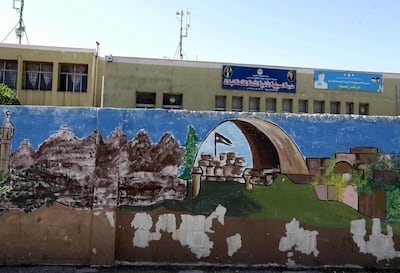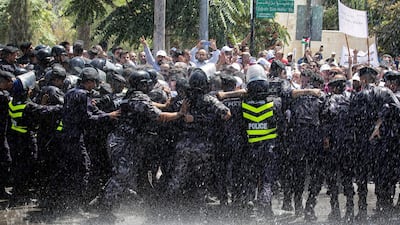Two teachers were arrested, thousands of children went without schooling and a nationwide teachers’ strike largely held firm in Jordan on Tuesday, as the government escalated its showdown with the union over a 50 per cent raise and pressured families and educators to start the delayed school year.
Amid government announcements that classes would resume after three-and-a-half week of strike action without an agreement with Jordan’s Teachers Syndicate, confusion and frustration persisted for parents as it remained unclear whether or not classes were being taught.
Yellow and orange school buses rumbled across the capital early Tuesday morning but upon closer inspection found half-full or empty.
The government reported at midday that over 1,000 government schools “broke the strike” and held classes, yet citizens expressed scepticism on social media.
Out of several schools visited by The National in west and central Amman, none were holding classes; blue- and green-uniformed students sat or walked around the schoolyard as a handful of teachers stood either at the gates or the doorway to the schools, upholding their strike.
Following a media blitz on Monday evening, the government did everything it could to get the word out, hanging banners over main streets in towns and villages and sending nationwide text messages to citizens reminding them that school would begin on Tuesday and any child who did not show up would be marked “absent”.

Yet many remained unsure that classes would be taught, while others did not send their children at all.
Instead of putting his 9-year-old daughter on the bus as he usually would, Amad Hussein, 45, had come to take his daughter to school himself Tuesday morning as he did not trust that schools would be in session.
After speaking with striking teachers at the entrance to his daughter’s school in West Amman, he led her back to their car and began the journey home.
“We Jordanians are patient because we know their pay is little, and we know the economic situation in the country,” Mr Hussein said from his car.
“The teachers must make concessions and the government must make concessions for us to resolve the issue,” he said. “Because in the end, our children pay the price.”
An administrative court on Sunday ruled the strike illegal and ordered teachers to reopen classes with the threat of arrest for breaking the court order.
The state prosecutor in the governorate of Irbid, northern Jordan, arrested two teachers on Tuesday for a 15-day-period for “abstaining from duties of public office,” multiple news agencies and the teachers’ union confirmed. However, they were released later the same day.
Facing arrest and the prospect of losing their jobs, many teachers vowed to continue the strike.
"We are still striking and we are not afraid because our demands are just,' said Mirvet Al Nouri, 51, one of seven teachers standing outside their primary school in Shmeisani, west Amman, told The National on Tuesday morning. "If we have the union behind us, there is no fear."
Teachers say that the 50 per cent increase of their base pay, which was promised by the government in 2014 and would push their salary to around JD420 a month, was “the bare minimum”. The government’s ‘final offer’ on Saturday of a JD23-JD31 per month raise depending on teachers’ seniority was a non-starter, they say.
“The government’s proposal amounts to a JD1 increase per day, that does not even cover the increase in fuel and transport costs this year,” Ms Al Nouri said.
As the day wore on tensions rose.
The government, which announced that it would bring in substitute teachers Monday evening, declared it would deduct JD15 from salaries for each day of the teachers strike starting from Tuesday.
Later in the day, the Legislative and Opinion Bureau ruled that striking teachers will automatically face losing their jobs.
The JTS could not be reached for comment on Tuesday.
While some complained that their children were turned away from school, many citizens affected by the strike remained sympathetic with the teachers.
“It is our children’s right to education, but it is also teachers’ right to a dignified life and working wage too,” said Um Suheib, a 33-year-old working Jordanian mother of four. “We need a solution, fast.”
Jordanians’ patience with the strike is largely due to numbers. With over 140,000 fulltime teachers, teaching is one of the largest professions in Jordan. In fact, the vast majority of families count at least one teacher among their ranks.
Walking a political tightrope, the government expressed both sympathies with teachers and issued stiff warnings Monday evening.
“Our message to teachers is that they know the respect we have for them, there is not a single house without a teacher and they have all our appreciation,” minister of education Walid Maani said on state-run Jordan Television Monday evening.
“But it is our duty to abide by the court decision, and the failure to implement it would result in criminal penalties that may include jail time.”
He also warned that according to government regulations, “if an employee abstains from work for a period of 10 days, we consider his employment terminated.”
The government also doubled down that the strike is unconstitutional, with minister of state for legal affairs Mubarak Abu Yamin declaring it “illegal” on Monday evening.
The impasse has placed both the Razzaz government and teachers’ union in a difficult position.
Billed as a liberal reformer who would listen and respond to citizens when he took over after his predecessor was ousted by popular protests over the economy in June 2018, Razzaz has struggled grappling with labour demands and a national debt crisis.
Giving in to the teacher’s demands would not only add JD112 million to the JD738 million deficit, but may encourage other government employees to launch similar work stoppages, observers and insiders say.
The JTS, meanwhile, believe it has reached the point of no return and that any future labour action will lack impact if their four-week strike fails to secure the 50% raise promise given by the government in 2014.

